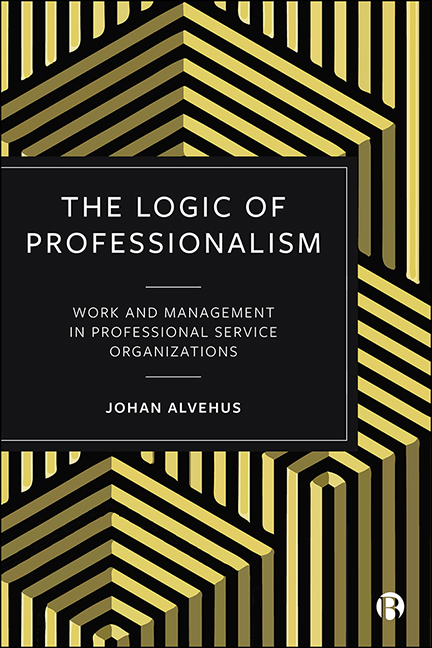Book contents
- Frontmatter
- Dedication
- Epigraph
- Contents
- About the Author
- Preface
- 1 Work in Professional Service Organizations
- 2 Professionalism from an Institutional Logics View
- 3 The Ambiguity of Professional Service Work
- 4 Control, and Control over Control
- 5 The Politics of Leadership
- 6 Superficial Hybridity
- 7 Understanding the Logic of Professionalism
- 8 The Future of Professional Work
- References
- Index
3 - The Ambiguity of Professional Service Work
Published online by Cambridge University Press: 30 April 2022
- Frontmatter
- Dedication
- Epigraph
- Contents
- About the Author
- Preface
- 1 Work in Professional Service Organizations
- 2 Professionalism from an Institutional Logics View
- 3 The Ambiguity of Professional Service Work
- 4 Control, and Control over Control
- 5 The Politics of Leadership
- 6 Superficial Hybridity
- 7 Understanding the Logic of Professionalism
- 8 The Future of Professional Work
- References
- Index
Summary
In the first chapter, I argued for a view of professional service organizations where work takes the centre stage. In this chapter, I ask: How can we describe professional service work processes? What is it that is going on when lawyers, teachers, and physicians do what they do on a day-to-day basis? I take work processes as the starting point for my discussion but as I am interested in organizational questions, I will of course also, at the same time, discuss the organization of professional service work. My starting point is a common assumption about professional service work: that it is, by its nature, ambiguous, and that this inherent ambiguity has profound consequences for how professional service work is organized and managed. In the subsequent discussion I will problematize this assumption and suggest another view – that ambiguity is an outcome of the way in which professional service work is organized, just as much as it is a cause of it. A key theme running through the discussion is division of labour, and already at this point I want to emphasize that when I discuss division of labour in this chapter, I refer to ‘detailed division of labour’, that is, the division of labour taking place between workers, in practice, on an everyday basis. In discussions about professions, division of labour between different professions is often the topic (Freidson, 2001). We can of course also discuss division of labour at a societal level, for example in terms of gendered division of labour (a wonderful example is Gibson-Graham, 1996). Here, though, I am concerned with the detailed division of labour.
I will first start by accounting for the ambiguity assumption in professional work, and from this I continue with reflections over the way in which professionals talk about work. After this, I introduce different models for professional problem-solving, one traditional with ‘cases’ at the centre, and one with clients at the centre. Then, I discuss a common theme in discussions about professional service work: that it bears great resemblance to craft work and the ethos of craft work. Finally, I conclude with a discussion of the division of labour in professional service work.
- Type
- Chapter
- Information
- The Logic of ProfessionalismWork and Management in Professional Service Organizations, pp. 30 - 49Publisher: Bristol University PressPrint publication year: 2021



